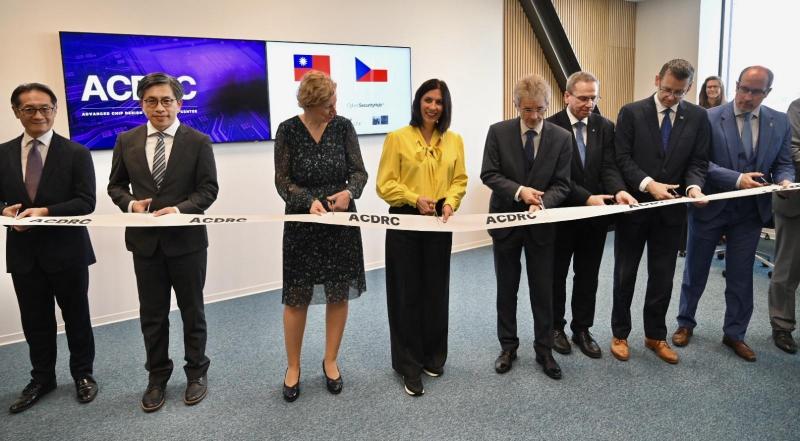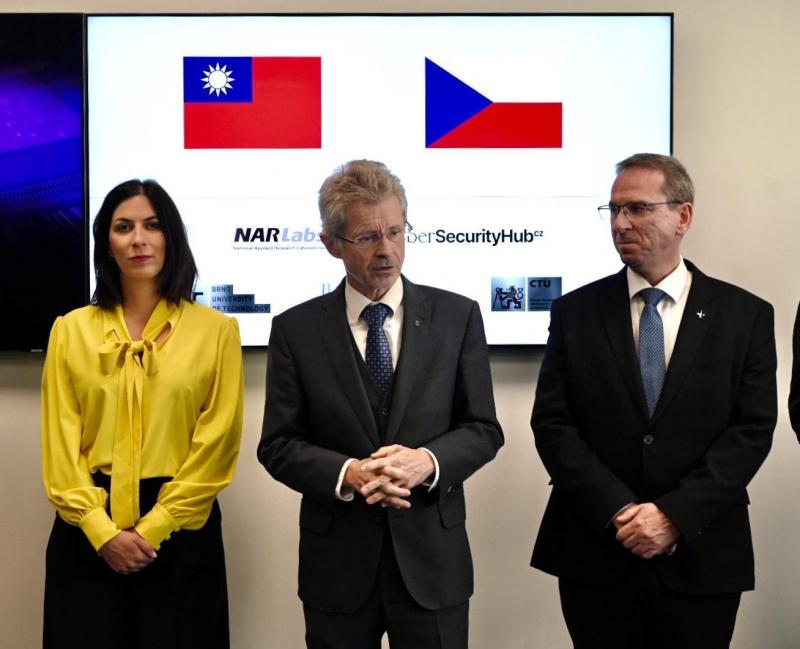BRNO UNIVERSITY OF TECHNOLOGY
Antonínská 548/1, 601 90 Brno
Czech Republic
phone numbers list
e-mail: vut@vutbr.cz
international@vutbr.cz
http://www.vutbr.cz/en



In the premises of the Cyber Security Hub, z.ú. (CSH) in Brno, the Advanced Chip Design and Research Center (ACDRC) was opened on Friday, 18 October. The center was created as a concrete initiative to develop relations between the Czech Republic and Taiwan. It represents one of the pillars of this cooperation in the field of semiconductors. On the Czech side, the project is carried out by experts from three leading Czech universities – Brno University of Technology, Czech Technical University in Prague, and Masaryk University. The goal is to educate new experts and support innovation and research in the semiconductor industry, with applications in areas such as cybersecurity, the automotive industry, energy, biomedicine, and telecommunications.

ACDRC is a platform for cooperation between the Czech Republic and Taiwan, as well as a platform for collaboration between three leading Czech universities. The project is coordinated by Taiwan’s national applied science laboratories NARLabs and CyberSecurityHubcz in the Czech Republic. Cyber Security Hub is a registered institution founded by the three leading universities collaborating in the semiconductor field: Czech Technical University in Prague, Brno University of Technology, and Masaryk University. The ACDRC Center is a project of CSH aimed at contributing to the technological development of the semiconductor industry, supporting professional development, and strengthening human resources capacity for the semiconductor industry while promoting the transfer of research results into practice.
The center focuses on coordinating and supporting cooperation in education and research with Taiwanese partners in the field of chip design and semiconductor technologies, which today are an integral part of the technology industry and a key factor in global industrial transformation. The development of the semiconductor industry ecosystem will help increase the global competitiveness of the Czech Republic. The ACDRC for cooperation with Taiwan is established as part of the semiconductor ecosystem in the Czech Republic within the Cyber Security Hub, z.ú.

The ACDRC project supports deeper cooperation between Taiwan and the Czech Republic and is the first pillar of the 2022-2026 Taiwan-Czech Democratic Partners Supply Chain Resilience and Capacity Building Cooperation Plan. The emerging center is expected to contribute to the development of human resources and know-how for the semiconductor industry in both countries. The ACDRC Center aims to connect experts, facilitate communication, internships, and mobility of students and academic and research staff from both the Czech Republic and Taiwan.
The opening of ACDRC was also attended by Markéta Adamová Pekarová, Speaker of the Chamber of Deputies of the Parliament of the Czech Republic. "In the long run, I consider the opening of the Advanced Chip Research Center here in Brno important because it will further help deepen relations between democratic partners – the Czech Republic and Taiwan," she said, adding: "The Advanced Chip Research Center is another significant milestone and will significantly improve our cooperation in the strategic area of advanced chips, on which almost all areas of human activity depend today."

In education, the cooperation between the Czech and Taiwanese sides focuses on coordinating and supporting education in the field of chip design and semiconductor technologies to prepare new specialists, especially in advanced forms of education, building on the knowledge gained in master’s and doctoral studies at Czech universities. The center will also offer a scholarship program, organize advanced courses in cooperation with universities in the Czech Republic and Taiwan, and hold lectures for high school students, summer and winter schools, and other educational events. In research, the main goal of ACDRC is to create conditions for the effective use of knowledge and experience between the Czech Republic and Taiwan and to support innovation, knowledge transfer, and collaboration between academia and industry. In collaboration with universities, the center coordinates the implementation of several research projects, including the development of an AI processor for the automotive industry and hardware security technology. Other supported research areas include chip cybersecurity, backend tools for electrical design automation of integrated circuits, AI on chips, bio-chips, and devices for quality control and testing of SiC technology. The conducted research and educational activities will primarily take place at the participating universities in Brno and Prague, where specialized laboratories will also be expanded to support individual research activities with Taiwanese partners.
Taiwanese investments also contribute to the development of the semiconductor ecosystem in Europe. These investments are mainly concentrated in Germany, but support in this area is also directed to the Czech Republic, particularly toward educational, research, and development activities in the semiconductor field.
In the Czech Republic, the semiconductor ecosystem is represented by the Czech National Semiconductor Cluster, which brings together the most prominent companies and institutions, including universities, that cover this technological chain. To develop this ecosystem and connect it to the European network of collaboration in the semiconductor field, the National Competence Center for Semiconductors is being established. The project has been submitted to the European Commission for approval, which is expected within a few months, no later than the first quarter of 2025.
The project behind the National Competence Center is led by two leading technical universities in the country, the Brno University of Technology (BUT) and the Czech Technical University in Prague (CTU), along with companies such as onsemi and Codasip, the Czech National Semiconductor Cluster, and the innovation agency JIC. The project is coordinated by the Brno University of Technology. Recently, a memorandum of cooperation was also signed between CTU, BUT, and the University of West Bohemia, aimed at strengthening mutual collaboration between academic institutions in semiconductor applications, including power electronics, where the University of West Bohemia is also a significant player.
The ACDRC Center, as a collaboration between CTU, BUT, and Masaryk University (MUNI) within the Cyber Security Hub, z.ú., becomes another part of this semiconductor ecosystem in the Czech Republic.
Published: 2024-10-21
Short URL: https://www.vut.cz/en/old/f19528/d267218
BRNO UNIVERSITY OF TECHNOLOGY
Antonínská 548/1, 601 90 Brno
Czech Republic
phone numbers list
e-mail: vut@vutbr.cz
international@vutbr.cz
http://www.vutbr.cz/en


